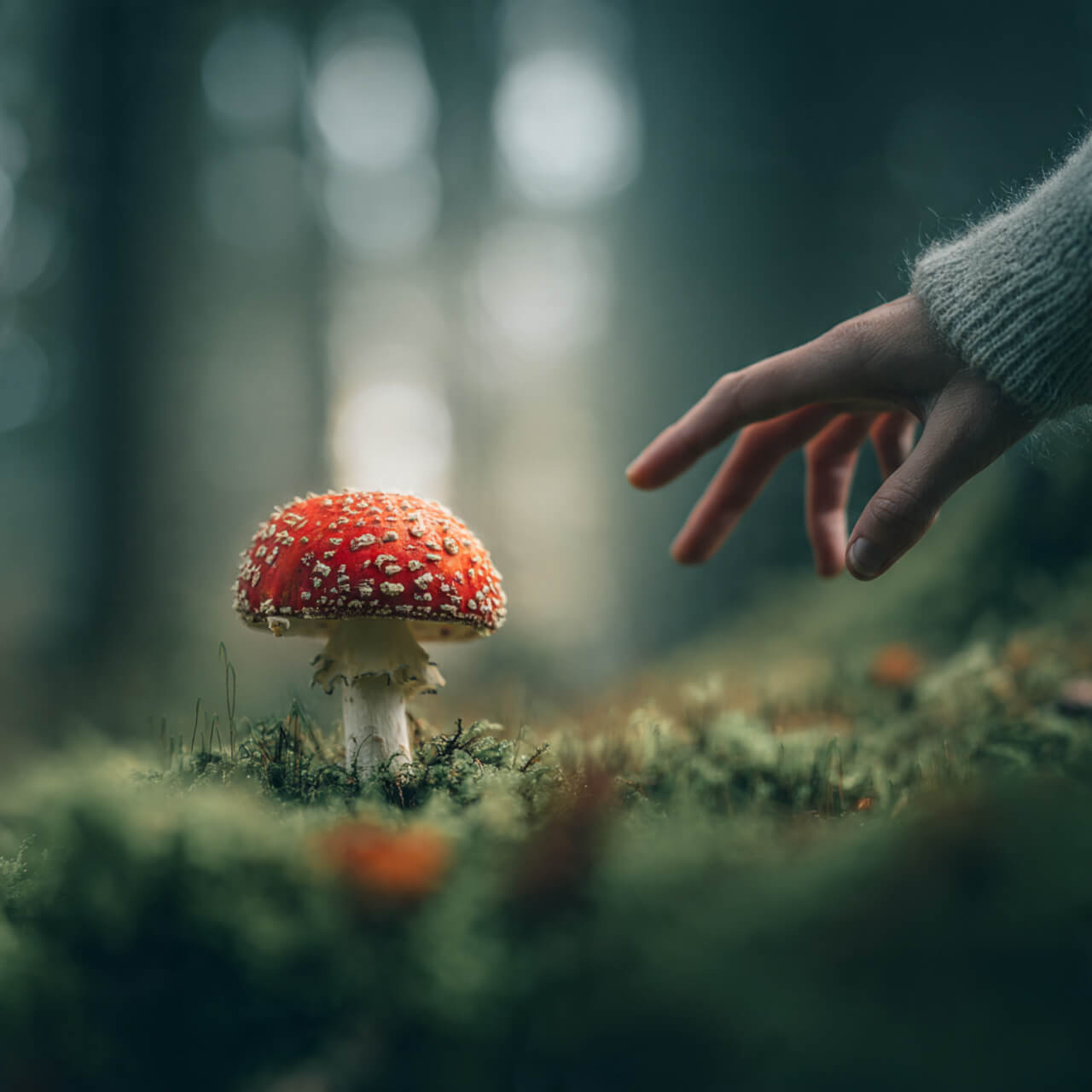Read time: 11 minutes
Quick Summary: Why do I feel lonely even with friends? You’re not broken. This post explains why you feel lonely, the hidden health risks no one talks about, and the small, science-backed steps that actually rebuild real connection.
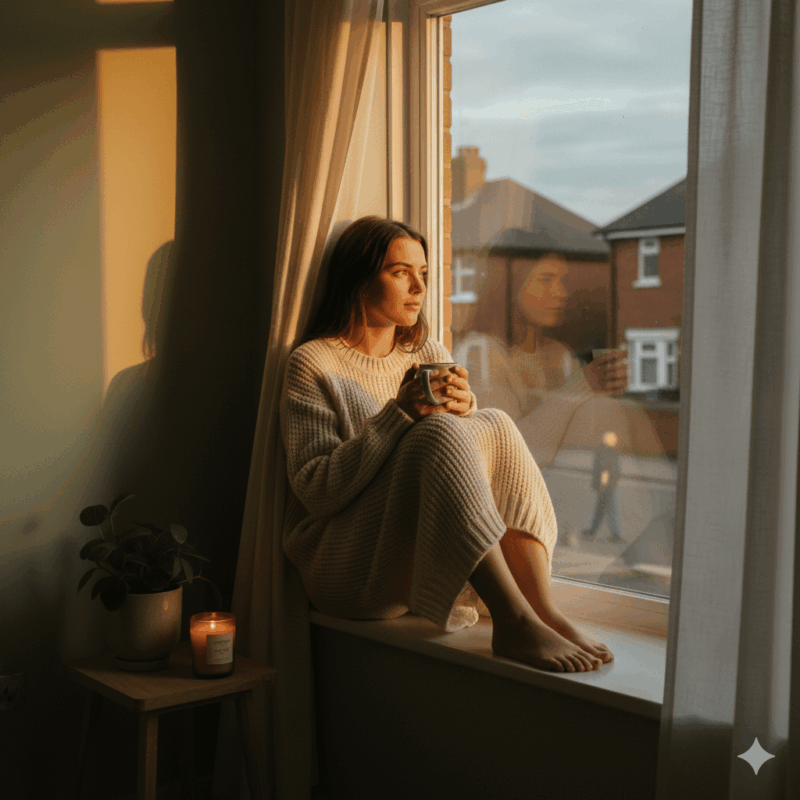
Why Do I Feel Lonely Even When Surrounded by People?
Short answer: “Why do I feel lonely in a crowd?” Because connection isn’t about numbers, it’s about feeling seen. When your nervous system reads low warmth or safety, you register loneliness even around others. It’s a signal to build small, genuine interactions, not a verdict on your worth.
You have friends. You show up and make conversation.
And yet that hollow feeling follows you everywhere like you’re watching life through glass, going through the motions but never quite connecting.
You scroll through your phone past names of people you used to talk to every day, asking yourself: “Why do I feel lonely?” Did you do something wrong? Should you reach out, or would that be weird now?
You’re not imagining it. And you’re definitely not alone.
According to the Office for National Statistics, nearly half of UK adults say they feel lonely at least some of the time, and about 7 percent — roughly 3 million people — describe themselves as lonely often or always.
The Guilt That Makes It Worse
But here’s what makes it worse: you feel guilty for feeling lonely. You have people. You have a social life. So why does it still feel like something’s missing?
The truth? Loneliness isn’t failure. It’s a signal that your body and brain asking for connection, not judging you for needing it.
- Why Do I Feel Lonely Even When Surrounded by People?
- What Are the Health Risks of Chronic Loneliness?
- Why Do I Feel Isolated Even When I’m Not Alone?
- How Does Social Media Use Affect Loneliness?
- What Are the 3 Types of Friendship (and Why Do I Feel Lonely in Each)?
- A Timeless Perspective on Friendship
- How Do Micro-Connections Improve Mental Health and Belonging?
- What Small Daily Actions Actually Reduce Loneliness?
- If This Doesn’t Quite Resonate with You
- 10 Proven Strategies to Reconnect
- Everyday Mastery Steps You Can Take Now
- What If You Think You’re Just Unlikeable?
- Finding Support When Loneliness Feels Overwhelming
- The Bottom Line: Why You Feel Lonely and Why It Can Change
- Your Next 3 Actions
- One Question for You
What Are the Health Risks of Chronic Loneliness?
If you’ve been brushing off your loneliness as “just a feeling” or something you should be able to handle on your own you need to know this:
Loneliness is killing people.
Not metaphorically. Actually killing them.
Research shows that chronic loneliness is as damaging to your health as smoking fifteen cigarettes a day. It increases your risk of premature death by 26 percent more than obesity, comparable to alcoholism.
Right now, loneliness may be quietly increasing inflammation and weakening your immune system, raising cortisol (your stress hormone) levels, increasing your risk of heart disease and stroke, and contributing to anxiety, depression, and problems with memory and focus.
As loneliness researcher Dr. Julianne Holt-Lunstad explains, “The effect of loneliness and social isolation on mortality is comparable to the impact of well-known risk factors such as obesity and smoking.” Your body perceives social isolation as a threat, like physical danger. It keeps you in a state of chronic stress, slowly wearing down your systems.
While this post draws on peer-reviewed research and personal experience, it’s not a substitute for professional support. If loneliness feels overwhelming or persistent, please speak with your GP or reach out to NHS Every Mind Matters or Mind UK.
And here’s the painful part: you can feel this lonely even when you’re surrounded by people. Even in relationships. Even with a packed calendar.
Because loneliness isn’t about how many people you have around you. It’s about how seen and connected you actually feel.
If loneliness feels like a quiet gap between you and others, learning to improve social intelligence helps bridge it through empathy and active listening.
Why Do I Feel Isolated Even When I’m Not Alone?
Here’s the truth most people don’t want to hear, but desperately need to understand:
You feel alone in a room full of people because you are alone.
Not in a depressing way. Just… honestly.
Even surrounded by people who care about you, you’re still in your own head, your own body, your own experience. No one can fully know what it’s like to be you. No one can take your pain away or fix your problems, no matter how much they love you.
And somewhere deep down, you’ve been expecting them to.
You think: “If I just had better friends, closer connections, someone who really understood me — then I wouldn’t feel this way.”
But people can deepen your world. They cannot fix you.
Even if you had the most devoted friends in the world, even if you had the perfect partner or the biggest social circle they can’t carry your burdens for you. They can’t solve what’s broken inside. They can’t make you feel whole if you don’t have peace within yourself.
That’s not their job. And it never was.
The painful irony? The more you expect others to complete you, the lonelier you feel when they inevitably can’t.
If your loneliness tends to deepen during darker months, you might like How to Beat Winter Blues in the UK — it shares calm, science-backed ways to lift your mood and reconnect with small joys through the season.
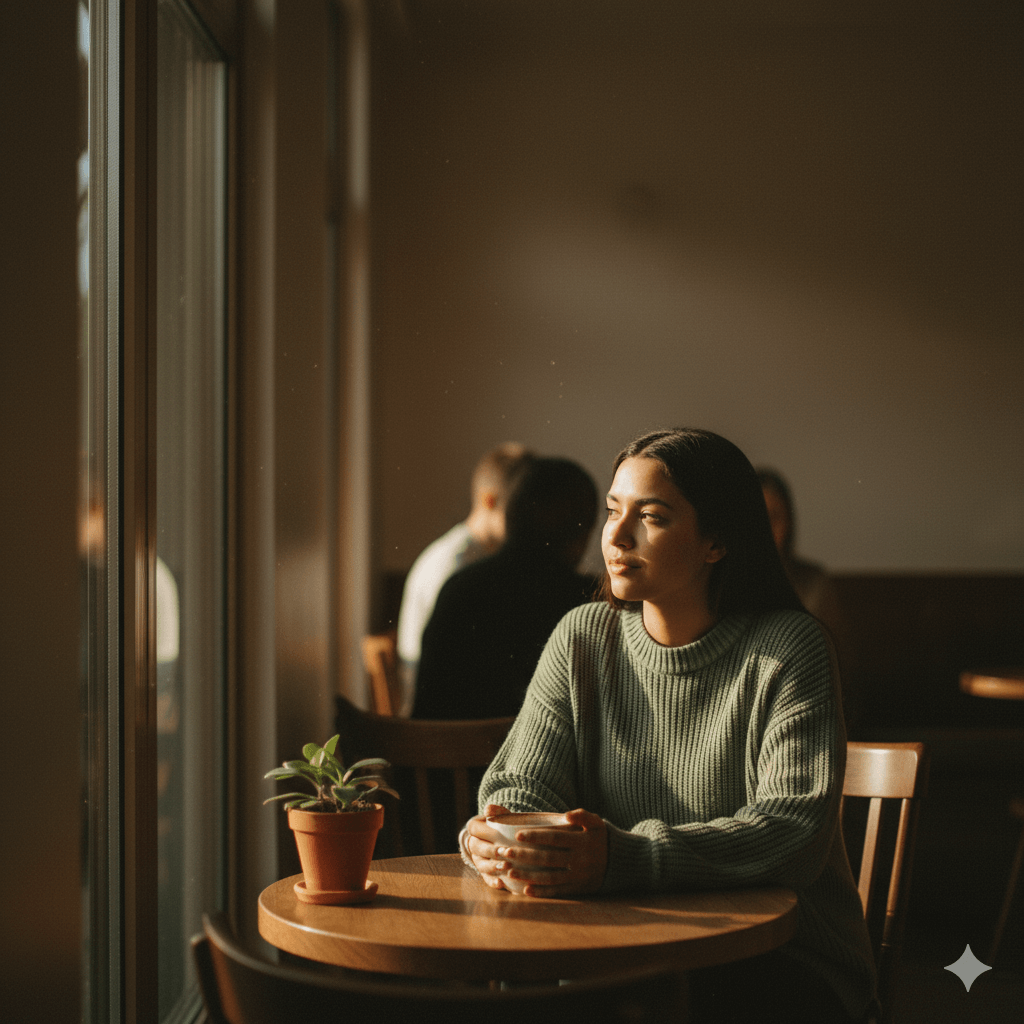
How Does Social Media Use Affect Loneliness?
We’re more “connected” than ever — so why do I feel lonely scrolling through hundreds of friends online?
Scrolling gives the illusion of closeness, but too often it’s comparison disguised as connection. You see everyone’s highlights and feel like you’re missing out, even though you’re seeing curated moments, not real life.
A 2018 University of Pennsylvania study found that limiting social media use to 30 minutes per day significantly reduced loneliness and depression.
You don’t need to quit entirely. Just use it differently: message someone instead of just liking their post, join supportive communities instead of chasing likes, and have a quick video call instead of endless scrolling.
Connection beats consumption every time.
If you’ve been feeling detached or stuck in routine, you might be living on autopilot – here’s how to recognise the signs and start waking up.”
What Are the 3 Types of Friendship (and Why Do I Feel Lonely in Each)?
Part of your loneliness might be coming from trying to maintain every friendship with the same intensity — like if you’re not texting regularly or making plans, you’re somehow failing.
But that’s not how real friendships work. There are roughly three types, and they’re all valid:
1. Friendships That Need to End
Some friendships were right for a season, and then they weren’t.
Maybe you’ve grown in different directions orm maybe their lifestyle doesn’t match yours anymore. Maybe the chaos they bring into your life doesn’t serve you.
You can wish them well without keeping their chaos in your life.
Research from the Royal Society shows we replace about half of our close friends every seven years. It’s not that you’re terrible at relationships — it’s that you’re evolving, and not everyone evolves in the same direction.
Letting go doesn’t make you cold or a bad friend. It makes you honest. If you’re struggling with this shift, learning how to let go of the past can help you release relationships that no longer serve you with grace rather than guilt.
2. Friends You Rarely See But Still Love
You have people you care deeply about, even though you hardly see them anymore. Different cities with different schedules. Different lives.
And you might feel guilty about it — like you should be doing more to maintain the relationship.
You don’t.
Research shows that friendships maintained through occasional but meaningful contact are just as satisfying as those with frequent interaction — as long as both people feel valued.
A simple text when you think of them: “Hey, hope you’re well. Love you.” That’s enough. No pressure. No expectation. Just a reminder that they’re still in your heart.
3. Everyday Connections You’re Overlooking
This is the one most people miss: the brief, warm exchanges that don’t look like “friendship” but actually matter more than you think.
The neighbor you wave to. The cashier who asks about your day. The stranger who stops to chat during your morning walk.
These aren’t deep relationships. But they’re doing something important: reminding your brain that you belong.
And right now, you’re probably walking past dozens of these opportunities every single day.

A Timeless Perspective on Friendship
Buddhist teachings offer something worth considering here If you’re asking yourself “why do I feel lonely” despite having friends, the answer often lies in quality over quantity.
If you cannot find a suitable friend, solitude is genuinely preferable to keeping company that drains or diminishes you. A friendship that pulls you down isn’t connection — it’s just noise.
But here’s the other side: when a friendship ends, you can still hold gratitude for what it gave you. The good memories, the lessons learned, the way it shaped you — those don’t disappear when the person does. You carry that wisdom forward into other relationships.
And perhaps most importantly: be the kind of friend you wish to have.
If you want someone who checks in, be the person who checks in. Want warmth without judgment? offer that first. If you want consistency, show up consistently.
You can’t control how others show up for you. But you can control the quality of presence you bring to every interaction — and that alone changes how connection shows up in your life.
How Do Micro-Connections Improve Mental Health and Belonging?
Here’s what researchers discovered: even brief positive interactions — like chatting with a barista or saying hello to a neighbor — significantly increase happiness and sense of belonging.
Why? Your brain doesn’t measure connection by depth or duration. It measures warmth.
Each small interaction triggers feel-good chemicals in your brain, calming your nervous system and signaling safety.
In simpler terms: when you share a smile or a kind word, your brain quietly whispers, “I’m part of this world.”
Every small moment of connection is a nervous-system reset.
So while you’ve been searching for that one perfect friendship or deep connection to solve your loneliness, you’ve been missing the dozens of brief, warm moments available to you every single day.
If loneliness is still lingering beneath a busy life, this piece on volunteering, Dana, and finding real connection beyond social media goes much deeper.
What Small Daily Actions Actually Reduce Loneliness?
Here’s what genuinely helps. Not big, dramatic changes. Just small shifts that actually work:
1. Accept That You’re Fundamentally Alone (And That’s Okay)
This isn’t depressing but it’s freeing.
Everyone has their own busy life. You have yours. They have theirs. That friend you’re waiting to hear from? They might be thinking about reaching out too, wondering if they should, worried it’s been too long.
When you stop expecting others to complete you or fix your loneliness, you remove an impossible burden from your relationships.
You can treasure the moments. Take what you can from every encounter and accept it for what it is. Take support when it’s offered. But also find peace inside yourself.
Because people can deepen your world, but they cannot fix you. And that’s not their job.
2. Stop Waiting. Reach Out First.
That person you’ve been thinking about? Text them.
That invitation you got? Say yes, even if you don’t feel like going.
Connection doesn’t wait for perfect timing or equal effort.
Show up for an hour. Be present. Leave if you need to. But honor the fact that someone thought of you.
And honestly? Sometimes you’ll end up staying. Sometimes you’ll actually enjoy it, even though you didn’t want to go. Connection has a way of surprising you when you give it a chance.
If fear is holding you back from reaching out or showing up, you’re not alone. Many people experience fear of change when it comes to shifting their social patterns, but small steps forward matter more than perfect execution.
3. Open Yourself to Everyday Connection
Tomorrow, try this:
Go for a walk. Head up. Make eye contact. Smile. Say good morning to people you pass.
Most will smile back. Some will stop to chat. It might feel awkward at first — that’s normal.
But these small moments add up. They remind your nervous system that you’re safe, seen, and part of something.
Use manned tills instead of self-checkout. Most cashiers love a quick chat. Say people’s names — the barista, your neighbor, the postie. Recognition creates connection.
These tiny actions might seem insignificant, but they’re exactly the kind of daily habits that transform your life — not through grand gestures, but through consistent, small acts of openness.
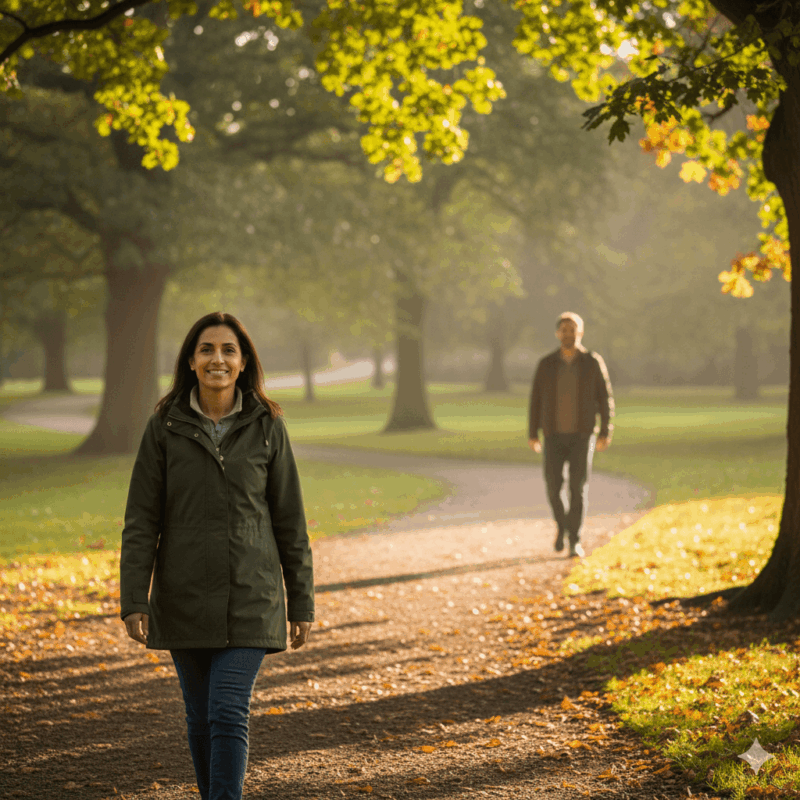
4. Find Shared Purpose
Here’s what research shows: people who volunteer regularly are 40% less likely to feel lonely.
Why? Because shared purpose builds connection faster than forced small talk.
If you’re looking for volunteering opportunities near you, sites like Do-It can help you find local projects that match your interests. Join something recurring — a volunteering gig, a walking group, a class. It doesn’t matter what it is. What matters is showing up regularly to the same place with the same people.
The first time will feel awkward. Everyone seems to know each other. But by the second or third visit, you’ll find yourself laughing with people you’d never have met otherwise.
These become the people who would show up if you needed them. Real people with real faces and real kindness that’s valuable.
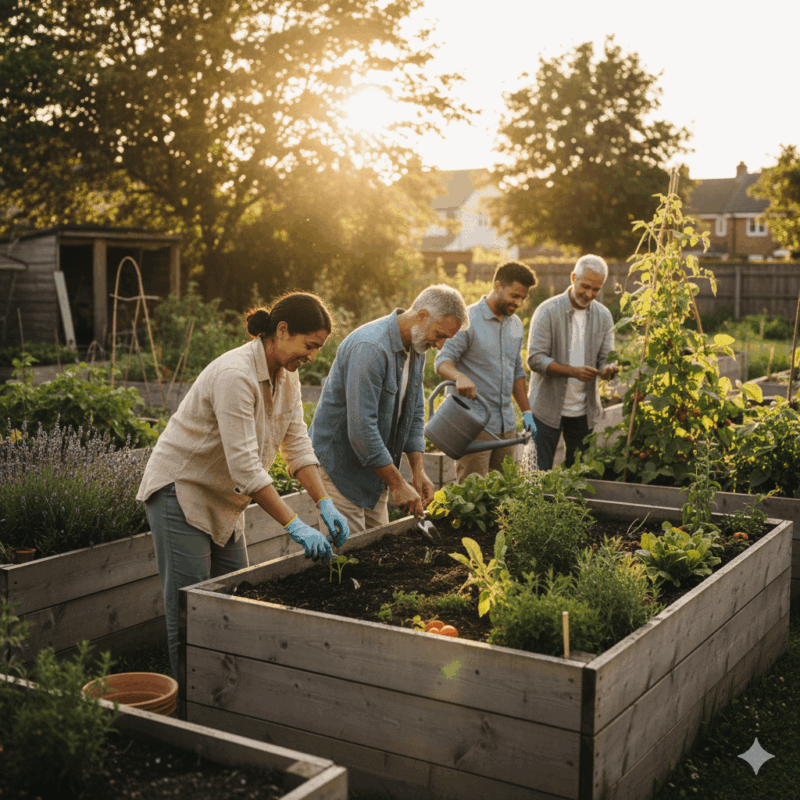
5. Let Go of One-Sided Friendships (Without Guilt)
If you’re exhausted from always being the one who reaches out, who makes plans, who checks in — listen:
You can’t force reciprocity.
Some people aren’t in a place to give back right now. Maybe they’re overwhelmed or maybe they’re emotionally unavailable. Maybe the friendship just isn’t what you need it to be.
You can step back without bitterness and you can stop keeping score. You can redirect your energy toward people and places where connection flows more naturally.
And if it truly feels one-sided and draining? It’s okay to let that relationship go. You deserve warmth that flows both ways.
If This Doesn’t Quite Resonate with You
If socializing feels draining or reaching out feels impossible, you’re not broken.
Introverts, highly sensitive people, and neurodivergent minds process stimulation differently. Connection might look quieter for you — one-to-one chats, creative spaces, or online communities that feel safe.
You don’t have to force what exhausts you. Find connection that fits your rhythm, not someone else’s idea of what connection should look like.
So if you’re still wondering “why do I feel lonely” , here’s what actually helps. Not big, dramatic changes. Just small shifts that work:
10 Proven Strategies to Reconnect
These aren’t just ideas they’re research-backed strategies that actually work. Start with any one of these to begin reconnecting:
Smile at three strangers today. Eye contact activates neural pathways linked to trust and belonging.
Use manned tills at the checkout. Break the autopilot. Chat for 30 seconds.
Say people’s names. The barista, your neighbor, the person at reception — recognition creates connection.
Go for a walk and greet people. Head up, smile, say good morning. See what happens.
Send one no-pressure check-in message. “Hey, thought of you — hope you’re okay.” Ten seconds. No reply needed.
Say yes to one invitation you’d normally decline. Show up. Stay an hour. Be present.
Find one local volunteering opportunity. Community gardens, food banks, animal shelters — shared purpose builds connection.
Walk the same route at the same time each day. Familiar faces lead to nods, then smiles, then conversation.
Ask one real follow-up question. Instead of “Good, thanks,” try “How’s your week going?” and actually listen.
Offer one small kindness today. Hold a door. Compliment someone. Share a useful tip. Kindness multiplies belonging.
Everyday Mastery Steps You Can Take Now
These aren’t big moves — just small, realistic shifts you can try today.
Notice what’s already there.
Write down one small connection from today — a smile, a wave, a chat. You’re already doing more than you think.
Move toward warmth.
Spend ten minutes somewhere you can be around others — a café, park bench, library. Let your body remember the feeling of “around people.”
Check your critic.
When that inner voice says, “This doesn’t count,” pause and reframe: every act of reaching out counts, even the quiet ones.
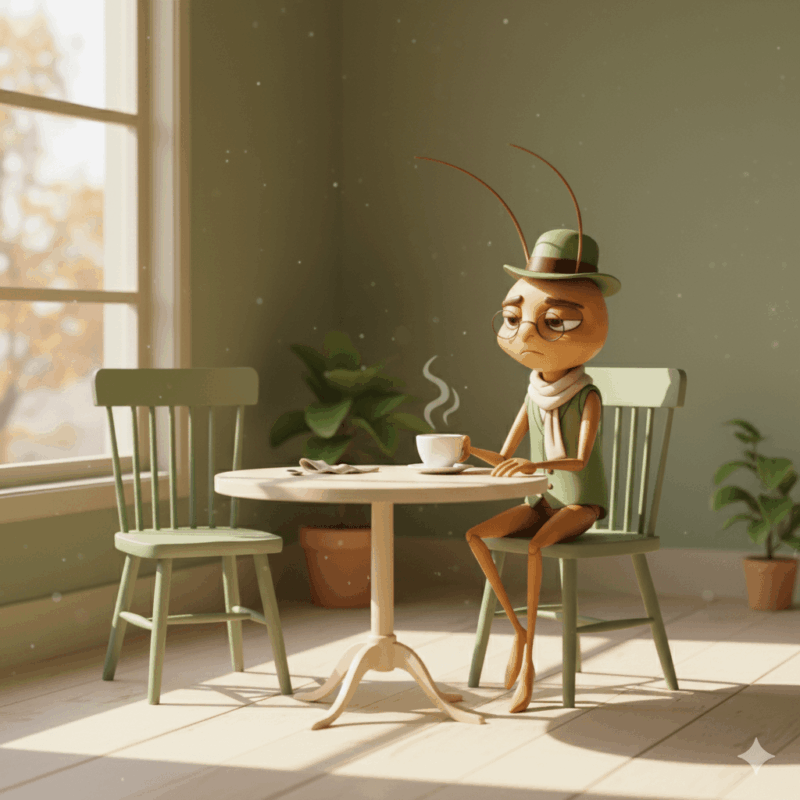
Mr Critic Moment:
“They don’t like you anyway,” he mutters. “Why bother reaching out? You’ll only make it awkward.”
Ah, there he is the familiar voice that sounds so sure of itself.
He’s only trying to protect you from rejection, but all he does is keep you isolated.
Next time he pipes up, answer softly: “Maybe you’re wrong. Maybe someone out there is waiting for this message.”

Journaling Prompt:
When does your inner critic appear around connection?
What’s one line he always says and how could you respond differently?
Who could you message this week, even if part of you feels silly doing it?
What If You Think You’re Just Unlikeable?
If you’re sitting there thinking, “This all sounds nice, but I don’t have long-term friendships. I think I’m just weird or unlikeable” stop. or If you’re sitting there thinking, “Why do I feel lonely when everyone else seems fine?” stop.
You don’t need to be universally likeable to find connection. You just need to be open to it.
Some of the most connected people are odd, quiet, awkward, or socially anxious. But they smile at strangers. They show up. They offer small kindnesses.
Bit by bit, they build a web of micro-connections that holds them.
You don’t need to change who you are. You just need to open the door.
Finding Support When Loneliness Feels Overwhelming
If loneliness feels heavy and you need more support, you don’t have to face it alone. Organizations like Mind UK offer mental health support and can connect you with local services. The Campaign to End Loneliness provides UK-specific resources and helps you find community groups in your area.
Your GP can also refer you to local mental health services, including therapy, counseling, or support groups specifically for loneliness and social anxiety. Many community centers and libraries run walking groups, book clubs, and hobby classes where you can meet people with similar interests in a low-pressure setting.
Remember: Asking for help isn’t weakness. It’s wisdom.
The Bottom Line: Why You Feel Lonely and Why It Can Change
If you’re asking “why do I feel lonely,” here’s the truth: you’re not broken.
.Friendships drift and end, that doesn’t mean you’re failing
You’re not unlikeable because you don’t have a big social circle.
You’re just human. And loneliness is part of the human experience.
But here’s what you can do:
Stop expecting others to complete you, and stop waiting for perfect friendships to solve your loneliness. Stop keeping score.
Start opening yourself to the small moments of connection that are already available.
The smile from a stranger. The chat at the till. The text you send without expecting a reply. The invitation you say yes to even when you don’t feel like it.
These moments won’t fix everything. They won’t take away your pain or solve your problems.
But they’ll remind you that you’re part of something. Even when you’re fundamentally alone in your own experience, you’re not separate from the world around you.
And sometimes, that’s enough.
Your Next 3 Actions
Do these today:
Smile at three people.
Text one person you haven’t spoken to in months.
Do one small kindness with no expectation in return.
That’s it. Start there.
One Question for You
What’s one tiny moment today that reminded you you’re part of something — even for a second?
About Everyday Mastery
Everyday Mastery blends science, mindfulness, and small daily actions to help you build habits that last.
Found this helpful? You can buy me a coffee to support more writing like this. Every cup helps me keep creating resources
Kel is the writer behind Everyday Mastery, where she shares the real, messy, and meaningful process of building habits, resilience, and self-belief from the ground up. Her writing blends ancient philosophy with modern science, always focused on small, practical steps that lead to lasting


